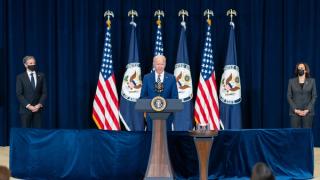Just 200 days into its first term, the Biden administration’s approach to the Indo-Pacific is already suffering from a lack of focus and urgency, which new research from the United States Studies Centre argues is undermining the United States’ ability to compete with China for regional influence.
Co-author of Correcting the course: How the Biden administration should compete for influence in the Indo Pacific and Director of Foreign Policy and Defence Ashley Townshend says "US Vice President Kamala Harris' visit to Southeast Asia this week did little to allay regional concerns that the Biden administration – like its predecessors – has no comprehensive plan for this key part of the world."
The report provides a roadmap for the administration to compete for influence in the Indo-Pacific, outlining 10 key judgements on the current state of play, as well as seven recommendations for the way ahead. Foremost among these is the need for President Biden to shift from an all-consuming focus on long-term global competition with China, to place greater emphasis on short-term competition for influence in the region.
"The stakes could not be higher," Townshend adds, "China's military power, economic weight, and assertive foreign policy agenda are reshaping the Indo-Pacific – undercutting US pre-eminence and risking a Chinese sphere of influence."
The fallout from the United States' chaotic withdrawal from Afghanistan is dominating the focus of senior administration officials, overshadowing hopes among regional countries who have been waiting for a pivot to Asia for the last decade.
“President Biden’s recommitment to strong Indo-Pacific relationships is welcome, but words alone will not safeguard the United States’ strategic position,” Townshend warns, “regional countries are looking to the Biden administration to finally deliver on the Indo-Pacific pivot that Washington has promised for a decade.”
To book a briefing with the report authors, please email us at ussc.media@sydney.edu.au
Key points
- The fallout from the United States’ withdrawal from Afghanistan will make it even more difficult for the Biden administration to make good on promises to focus on the Indo-Pacific.
- Despite its deep regional expertise and the region’s high expectations, the Biden administration has failed to articulate a comprehensive regional strategy or treat the Indo-Pacific as its decisive priority.
- The Biden administration’s focus on long-term global systems competition with China overlooks the urgency of near-term competition in the Indo-Pacific.
- The Biden administration cannot compete against China effectively in the Indo-Pacific without prioritising engagement with all of Southeast Asia, empowering US allies, and committing to mutually beneficial economic engagement with the region.
Media enquiries
Taylor Mellor
T 02 9114 2622
E taylor.mellor@sydney.edu.au





